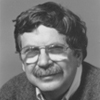∫ archives ∫ A. Nico Habermann Award
CRA makes this award, usually annually, to a person who has made outstanding contributions aimed at increasing the numbers and/or successes of underrepresented groups in the computing research community. This award recognizes work in areas of government affairs, educational programs, professional societies, public awareness, and leadership that has a major impact on advancing these groups in the computing research community. Recognized contributions can be focused directly at the research level or at its immediate precursors, namely students at the undergraduate or graduate levels.
1995Eugene Lawler
 Professor of Computer Science at University of California at Berkeley
Professor of Computer Science at University of California at Berkeley
The 1995 CRA Nico Habermann Award will be presented to the family of the late Eugene Lawler for the outstanding contributions he made to promote the entry of female, minority, disadvantaged and disabled students into graduate research programs in computer science at the University of California at Berkeley.
As professor of computer science at Berkeley, Lawler played a major role in the establishment and operation of Berkeley’s Computer Science Re-entry Program. This program, which was established in the 1980s and was one of the first of its kind, made it possible for underrepresented students trained in other fields to prepare themselves for graduate studies in computer science. Lawler was the first faculty chair for the Re-entry Program and served for four years in that capacity.
Lawler promoted admissions of women and ethnic minorities into the graduate program and made recruiting trips to the Southwest on behalf of Chicano recruitment. His advocacy efforts on behalf of women, minorities and disabled students extended beyond Berkeley to the National Science Foundation and the American Association for the Advancement of Science. He was videotaped for the AAAS Access to Engineering Project, which was designed to encourage disabled students to aim for engineering careers. He worked with the Berkeley Disabled Students Center to try to obtain reading aids for blind students.
But his efforts went beyond admissions, to mentoring and advising. He carefully followed his students to make sure they found a research adviser and received financial support. He gave generously of his time, counseling students with patience, good sense and wisdom.
1828 L STREET, NW SUITE 800, WASHINGTON, DC 20036 | P: 202-234-2111 | F: 202-667-1066




